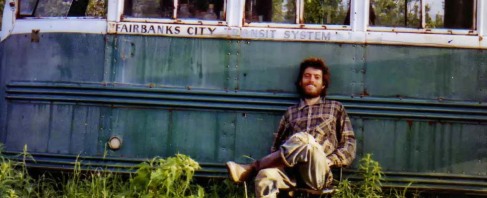
Ovviamente, nel lunghissimo periodo durante il quale l’uomo si nutrì solo di frutta nella sua patria d’origine, la foresta intertropicale fruttifera, il suo fabbisogno proteico non potè essere coperto altro che dal contenuto proteico della frutta.
Cerchiamo invece di capire i motivi dell’avvento del carnivorismo nella vita dell’uomo, fatto che ha tutte le caratteristiche di una tragica involuzione, dalla quale prese l’avvio la degenerazione fisiopsichica dell’uomo attuale; anche le modalità con le quali questo evento ebbe a realizzarsi sono degne di attenzione. Ecco perchè è necessario parlarne prima di riprendere il discorso sulle proteine.
Durante la preistoria dell’uomo si verificarono eventi meteorologici e geologici che alterarono profondamente l’ambiente. In particolare vennero alterati i biomi vegetali dai quali l’uomo traeva il proprio nutrimento. Avvennero:
* glaciazioni (espansioni dei ghiacciai)
* interglaciazioni (ritiri dei ghiacciai e avvento di climi più caldi)
* periodi di forte inaridimento climatico (siccità)
* periodi di aumenti eccezionali di piovosità (pluviali)
Per l’uomo fu particolarmente importante l’ultima glaciazione, denominata WERM, per la precisione WERM III, dell’era quaternaria (pleistocene). Tale immane glaciazione comportò l’avanzata dei ghiacciai su gran parte delle regioni euroasiatiche, con conseguente distruzione delle foreste e con effetti che si protrassero sino a 10.000 anni fa circa. Ma coeve di tale glaciazione furono le intensissime precipitazioni (pluviali) che si verificarono in Africa; ed anche questi eventi climatici furono gravidi di conseguenze per l’uomo. A tali pluviali fecero seguito delle fasi di calo drastico delle piogge e di conseguente inaridimento del clima. A tutto questo bisogna aggiungere gli effetti della formazione della Great Rift Valley, lungo la quale l’Africa si è come spaccata a causa di un grandioso effetto tettonico, tuttora in corso.
L’insieme di tali eventi provocarono notevolissime riduzioni delle foreste che si trasformarono prevalentemente in savane.
L’uomo fu così costretto a comportarsi come un animale da savana, per sopravvivere, fu costretto a cibarsi di quello che in tale ambiente trovava. Vi trovò le graminacee, piante che richiedono spazi aperti, luce solare diretta, condizioni offerte dalla savana e non dall’ombrosa foresta donde l’uomo proveniva. Ci dice il prof. Marcelle Cornei, illustre studioso, dal quale tanto abbiamo appreso, nel suo “Quaderno della salute“: “L’uomo, per derivazione ancestrale, è una scimmia d’ombra: visse per milioni di anni sugli alberi, nell’ombra delle fronde; sceso a terra, poi, vagò per altri milioni di anni nella savana”.
Ora, le graminacee producono frutti secchi, inodori e insapori;
sono, insomma, come dicemmo, cibo per uccelli. Con artifici l’uomo riuscì, con l’aiuto del fuoco, ad utilizzare queste cariossidi. Ma l’evento più rivoluzionario che occorse all’uomo, comportandosi come un animale da savana, fu il ricorso, a scopo alimentare, alla carne degli erbivori abitatori della savana, divenendo così, per necessità, un mangiatore di carne, sempre però con l’aiuto del fuoco, non potendo mangiare crudi ne le cariossidi dei cereali ne le carni. Senza l’artificio della cottura e (per i cereali) della molitura, l’uomo non avrebbe potuto diventare ne un mangiatore di carne, ne cerealivoro, giacché le sue caratteristiche anatomiche naturali (vedi Caratteristiche fisiologiche tra carnivori, erbivori e onnivori a confronto) da sole, non lo avrebbero consentito.
L’impatto con le innaturali deviazioni alimentari (cereali e proteine di cadaveri di animali, peraltro cotti, cioè morti) ebbe, per l’uomo, conseguenze catastrofiche in termini di salute e di durata della vita: il che è comprensibile, dato quello che io chiamo “salto a strapiombo” tra un alimento vivo e vitalizzante come la frutta da una parte e gli alimenti amidacei e carnei, cadaverici e mortiferi, iperproteici come la carne, uccisi e quindi devitalizzati con la cottura, dall’altra.
Reay Tannahill nella sua “Storia del cibo” ci dice che addirittura “durante il periodo dei Neanderthaliani meno della metà della popolazione sopravviveva oltre i 20 anni e 9 su 10 degli adulti restanti morivano prima dei 40 anni”.
Fu soprattutto l’avvento del cibo carneo, con il suo contenuto eccessivo di proteine e con la conseguente tossiemia a produrre tali disastrosi effetti sul corpo, ma anche sulla mente degli uomini; non bisogna infatti dimenticare che la carne crea aggressività.
S’è detto prima che anche le modalità con le quali questi eventi così negativi si produssero “sono degne di attenzione”. Accenniamone, quindi riferendo, in succinto, quanto a questo riguardo dice James Collier, autorevole antropologo: “In conseguenza dei disastrosi effetti di tali eventi sconvolgenti sul clima e sulla vegetazione, l’uomo non potette più affidarsi ai vegetali per nutrirsi e dovette ricorrere alla carne.”
Ma l’uomo è inerme, quindi non è per natura carnivoro, essendo sfornito anatomicamente dei dispositivi atti ad inseguire, uccidere e masticare, crude, le carni degli erbivori. Si pensa pertanto che l’uomo primitivo non sia stato, all’inizio, tanto un cacciatore quanto uno spazzino, che si nutriva delle prede fatte da altri animali veramente carnivori, mancandogli anche la insensibilità necessaria per aggredire ed uccidere con le proprie mani degli animali pacifici e innocenti, oltre che inermi. Forse, adoperando sassi e bastoni, l’uomo riusciva ad allontanare il leopardo dall’antilope uccisa, se ne impossessava e la trascinava al sicuro nel suo rifugio. Tale comportamento è stato chiamato anche “sciacallaggio”.
Ma l’uomo non si limità a sottrarre agli animali carnivori parte delle loro prede, ma fu costretto anche, quando non trovava da esercitare tale funzione di sciacallaggio, a cacciare direttamente, forzando la sua naturale non-aggressività, spintovi sempre dalla necessità di trovare i mezzi per sopravvivere. Il prof. Facchini (docente di antropologia all’Università di Bologna) si dice certo che l’uomo preistorico adoperò il fuoco a scopo culinario soprattutto per cuocere la carne. Concorda su tale affermazione anche il prof. Qakiaye Perlès, dell’Università di Parigi.
Ma oggi per fortuna non esistono più le ragioni di forza maggiore che obbligarono i nostri antenati ad alimentarsi con cadaveri di animali per assicurarsi il fabbisogno proteico; pertanto da molto tempo l’uomo ha inserito in misura crescente frutta, verdura e ortaggi crudi nella propria dieta. Occorre però vigilare sempre, per difenderci dall’autentico agguato che le industrie alimentari ci tendono continuamente proponendoci, ricorrendo alla propaganda a mezzo dei mass-media e all’opera nefasta di medici prezzolati, sostanze di dubbia convenienza o addirittura nocive.

Nonostante l’uomo si sforzi di nascondere a se stesso la verità, la realtà è una sola (e la dimostreremo successivamente): noi non siamo carnivori. Analizzando con scrupolosità il corpo umano e i suoi processi digestivi, non si può che giungere a questa conclusione.
Per dare un’idea dell’ipocrisia dell’uomo e della commedia che mette in atto per celare la verità, basta ragionare – anche per un solo attimo – sul modo in cui mangia la carne. L’uomo è costretto a camuffare questo cibo – non compatibile con il suo organismo – con una infinita quantità di salse e salsette, non prima di averlo fritto o bollito o invecchiato, e trasformato in mille modi.
Se davvero l’uomo è un carnivoro (come molti, anzi moltissimi, credono), perché non mangia la carne come tutti gli altri veri carnivori, e cioè cruda? Sarebbe opportuno porsi di tanto in tanto questo genere di domande, senza dare tutto per scontato e senza dare credito alle altrui opinioni a scatola chiusa.
Molti biologi e fisiologi sono d’accordo nell’affermare che l’uomo, in realtà, non è fisiologicamente “costruito” per mangiare carne, e offrono prove estremamente convincenti. Vediamo quali: la classe dei carnivori ha una struttura fisica predatoria (artigli, canini sviluppati), intestino breve (solo 3 volte la lunghezza del tronco) e fortemente acido (10 volte di più di un normale erbivoro); l’intestino breve, lungo 3 volte il tronco, serve ad evitare una sosta troppo prolungata della carne ingerita, in quanto essa è facilmente putrescibile. L’intestino breve, inoltre, è fortemente acido perché deve neutralizzare le sostanze tossiche carnee.
Vediamo come avviene la digestione della carne: una volta giunta nello stomaco la carne ha bisogno, per essere digerita, della secrezione di succhi gastrici ricchissimi di acido idrocloridico. I carnivori, infatti, secernono grandi quantità di acido idrocloridrico, atto a sciogliere le ossa. Il tratto intestinale dove avviene l’ultima parte della digestione, che serve a far passare gli elementi nutrivi nel sangue, deve per forza di cose essere meno lungo possibile: si deve considerare, infatti, che il pezzo di carne altro non è che un cadavere in putrefazione che crea velenosi rifiuti all’interno del corpo. Il carnivoro, quindi, deve liberarsene il più presto possibile. Il problema, per i non carnivori, è la lunghezza del tratto intestinale, che a volte è lungo addirittura 20 volte il tronco. Se i non carnivori mangiassero carne, questa rimarrebbe nel loro corpo un tempo troppo lungo, avvelenandoli.
Passiamo alla classe degli erbivori: struttura fisica forte ma non aggressiva, dentatura priva di veri incisivi superiori per addentare frutti, e canini per dilaniare; intestino lungo sino a 20 volte il tronco, enzima digestivo capace di trasformare e assimilare la cellulosa delle piante. Gli erbivori secernono una quantità minima di acido idrocloridrico, non sufficiente a digerire del tutto la carne.
Poi c’è la classe degli onnivori, parenti stretti dei carnivori, che conservano una certa aggressività e sono simili in molte caratteristiche fisiche ai carnivori; molti, ad esempio, non collocano il cane tra i carnivori, poiché se nutrito di sola carne esso muore.
Adesso osserviamo l’uomo: struttura fisica non aggressiva, tubo digerente lungo 12 volte la lunghezza del tronco, mandibole deboli e non pronunciate, secrezione salivare idonea (grazie alla ptialina) agli amidi dei cereali, dentatura sviluppata soprattutto negli incisivi per mordere e addentare frutti e nei molari piatti e robusti per macinare semi, stomaco debole e poco acido, che non possiede gli enzimi adatti a neutralizzare le sostanze tossiche prodotte dalla decomposizione della carne; inoltre il suo intestino ha bisogno di stimoli che favoriscano il movimento peristaltico: frutti, cereali ed ortaggi hanno queste capacità, la carne no. L’intestino crasso, inoltre, per ottimizzare la sua funzione deve avere un contenuto acido: i semi, le radici e i frutti lasciano nel crasso residui acidi, mentre le carni lasciano residui alcalini: ammoniaca e basi diverse. Fisiologicamente l’uomo è più simile ai mangiatori di piante e agli animali da pascolo e da foraggio (come le scimmie, gli elefanti e le mucche), che non ai carnivori come tigri e leopardi. I carnivori, ad esempio, non traspirano dalla pelle: la temperatura corporea viene regolata con il respiro accelerato e l’estrusione della lingua. Gli animali vegetariani, invece, sono dotati di pori sudoriferi per eliminare le impurità e regolare la temperatura.
Tutte coincidenze?
I carnivori devono lambire i liquidi (esempio: i gatti), mentre gli animali vegetariani succhiano i liquidi attraverso i denti, come gli uomini.
Pare proprio che l’uomo non rientri né nella classe dei carnivori, né in quella degli onnivori, anzi per alcune caratteristiche fisiche potrebbe essere accostato ai frugivori (come le scimmie) ed in modo minore ai granivori (scoiattoli e topi). Vediamo perché: l’uomo ha una mano pensile come le scimmie e i roditori, atta ad afferrare e cogliere frutti ed oggetti tondeggianti. Se consideriamo la placenta, quella umana è discoidale, come quella delle scimmie antropoidi. Sembra dunque che l’uomo abbia come cibo elettivo i semi, la frutta, la verdura e gli ortaggi.
Quale conclusione dovremmo dunque trarre da questa breve analisi scientifica?
Esistono prove evidenti del fatto che gli essere umani non sono adatti a mangiare carne, e chi decide volontariamente di ignorare tali prove, se ne assume tutte le responsabilità.

La classe degli onnivori è infine composta da parenti stretti dei carnivori, in grado di adattarsi ad una dieta più varia ma paludati di molte caratteristiche fisiche dei carnivori stessi e di una certa aggressività, come ad esempio il cane o l’orso.
Adesso osserviamo l’uomo: struttura fisica non offensiva (priva di naturali strumenti per conquistare le prede), tubo digerente lungo 12 volte la lunghezza del tronco, mandibole deboli e non pronunciate capaci di movimenti verticali e orizzontali, secrezione salivare provvista di ptialina, dentatura sviluppata sopratutto negli incisivi per mordere e addentare frutti e nei molari piatti e robusti per macinare semi, stomaco debole e poco acido, mancanza dell’uricasi, campo visivo ampio, stereoscopico e visione dei colori per individuare meglio i frutti colorati, ghiandole sudorifere diffuse in tutto il corpo; inoltre il suo intestino ha bisogno di stimoli che favoriscano il movimento peristaltico come frutti, cereali ed ortaggi, che a differenza della carne hanno questa attitudine.
La grande capacità dell’intestino crasso e del colon dimostra la loro conformazione adeguata per la sosta ed il transito di scorie di cellulosa e lignina (fibre), eventi che non si verificano nel caso dell’alimento carneo privo di scorie indigeribili. Il crasso inoltre per ottimizzare la sua funzione deve avere un contenuto acido: i semi, le radici e i frutti lasciano in esso residui acidi, mentre le carni lasciano residui alcalini (ammoniaca e altre basi).
Da tutto questo l’uomo non sembra rientrare né nella classe dei carnivori, né in quella degli erbivori e tanto meno in quella degli onnivori, mentre invece presenta tutte le caratteristiche della classe dei frugivori (le scimmie ad esempio) ed in modo minore quelle della classe dei granivori (tipo scoiattolo o topo).
L’uomo ha una mano pensile come le scimmie e i roditori, adatta per afferrare e cogliere frutti ed oggetti tondeggianti; inoltre se consideriamo la placenta, che il biologo inglese T. H. Huxley riteneva la miglior base per la classificazione della specie, l’uomo è sicuramente da ritenere appartenente alla categoria dei frugivori dato che la placenta umana è discoidale come quella delle scimmie antropoidi.
Anche la posizione della mandibola e della dentatura inferiore, rientrante rispetto alla dentatura superiore, è tipica non solo dell’uomo ma anche delle scimmie e degli animali vegetariani in genere.
Pare proprio che l’uomo abbia come cibo elettivo semi, frutta, verdura e ortaggi. Del resto è provato che allo stato naturale può vivere in perfetta salute nutrendosi soltanto di frutti e radici: ne fanno un valido esempio gli indigeni delle isole Marianne che pur essendo vegetariani, nutrendosi solo di frutti e radici crude e non cuocendo nessun alimento, sono forti ed in grado di trasportare sulle spalle fino a 250 kg., esenti da malattie e con durata della vita media nettamente superiore a quella europea.
Essere in armonia con la propria fisiologia comporta il rimanere in perfetta salute; è come dire lasciare al leone la sua carne, allo scoiattolo le sue noci ed i suoi frutti, alla pecora la sua erba e le sue radici. Nella storia dell’uomo l’avvento del cibo carneo è così recente e innaturale da non aver fatto scattare meccanismi evolutivi in tal senso. I nostri molari sono ancora a quelli delle nostre cugine scimmie ed il nostro intestino è ancora troppo lungo e poco acido per consentire il transito di carne.
Commento NdR: I fanatismi non sono l’ideale per nessuno, anche perche’ i vegetariani piu’ stretti ed i vegani, non tengono conto che ogni soggetto ha un tipo di gruppo sanguigno e quindi deve alimentarsi in funzione anche di esso.
E’ come voler far funzionare una vettura a benzina con una benzina a diverso numero di ottani rispetto al quale e’ tarata, il risultato sara’ che l’auto NON funzionera’ bene.
Quindi suggeriamo a TUTTI di alimentarsi seguendo le regole della Emodieta e di rimanere quasi vegetariani, con predominanza del cereale RISO, infatti vi e’ un detto antico che dice: …il riso fa’ buon sangue e non si riferisce solo al ridere…. Il RISO e’ il cereale piu’ consumato nel mondo.
Alimento base di circa 1/3 della popolazione terrestre. Il riso e’ il nome di circa 19 specie di piante erbacee annuali, della famiglia delle graminacee, ma solo la Oryza sativa e’ importante per l’alimentazione umana.
L’Oryza sativa e’ una pianta originaria delle regioni dell’Asia sudorientale si dice coltivata in modo intensivo da piu’ di 7000 anni, come dimostrano alcuni reperti databili intorno al 5000 a.C., ritrovati nella Cina orientale e ad altri reperti risalenti a 6000 prima dell’era volgare, ritrovati in una caverna della Thailandia settentrionale.
L’ESSERE UMANO era ed e’ VEGETARIANO od ONNIVORO ?
L’essere umano appartiene all’ordine dei primati antropomorfi, per loro natura frugivori, cioè atti a consumare frutti, foglie, semi. La neurofisiologia, l’embriologia, l’anatomia comparata confermano come l’uomo sia strutturato per cibarsi di frutti, noci, germogli freschi, foglie tenere, tuberi, radici e non di muscoli, ossa ed interiora come i carnivori.
Questi infatti hanno conformazione dentale, patrimonio enzimatico, organi visivi, strutture di offesa, caratteristiche di potenza e d’aggressività, apparato digerente, intestinale, escretorio, sudorifero, circolatorio adatti ad utilizzare l’alimento carneo anche come fonte glucidica, consumandolo crudo e completo di interiora e sangue. Gli esseri umani senza mezzi artificiali difficilmente sarebbero in grado di cacciare.
Molti sono ormai gli scienziati concordi nell’affermare che l’uomo si è convertito a consumare muscoli di animali (in principio carogne) per necessità legate alla inospitalità delle foreste nell’ambiente originario, circa 2 milioni di anni fa nell’era Neozoica, periodo Pleistocene. In quell’epoca avvennero infatti glaciazioni, interglaciazioni (ritiro dei ghiacciai e avvento di climi più caldi) e periodi di siccità contrapposti a forti diluvi: eventi climatici instabili ed irregolari che decretarono la riduzione di gran parte della vegetazione spontanea, nonché il mutare delle foreste in savane.
L’ Homo Habilis sarebbe dunque passato al carnivorismo per poter sopravvivere, pagando però lo scotto di un accorciamento della vita media. L’uomo è diventato carnivoro in epoche in cui non si conoscevano i danni della carne: oggi solo gli esquimesi restano un popolo carnivoro per necessità assoluta.
Essi consumano non solo la carne ma anche gli organi interni e le interiora e bevono il sangue. La durata media della vita di questo popolo è di 25-30 anni. Muoiono vittime della arteriosclerosi causata dall’alimentazione carnivora.

LA DENTIZIONE
Si riconosce universalmente che la forma dei denti ha una grande importanza nella determinazione della classificazione degli animali. Ora, un semplice colpo d’occhio ci convince qui che la scimmia antropoide si piazza tra l’uomo ed i carnivori e non viceversa. In altri termini, l’uomo, come diceva Graham, è l’archetipo dei frugivori.
L’individuo pigro che obbietterà di non poter fare lo sforzo della ricerca, non ha che da informarsi sui denti dell’uomo attraverso una via più corta. Aprite dunque la bocca del vostro gatto o cane e notare i canini lunghi, conici e taglienti, che possono introdursi in due solchi opposti che si trovano proprio per quello. Notate la fila di incisivi tra i canini, e le due serie di denti collo scopo evidente di tagliare e di bilanciare.
Confrontate poi questi denti colla struttura e la sistemazione del tutto diversa dei vostri propri denti. Cercate infine, di produrre un movimento di macinazione laterale colla mascella inferiore del vostro gatto e vedrete che il povero gatto vi dirà a modo suo che ciò non è naturale. Allo stesso modo si può esaminare un levriero o un bulldog.
Questi fatti sono universali e non accidentali. Non esiste carnivoro sulla terra senza canini lunghi, conici e taglienti, o che sia capace di macinazione laterale colla mascella. Non esistono nemmeno animali frugivori o erbivori con canini uguali. L’uomo appartiene dunque, fisiologicamente parlando, alla categoria dei frugivori.
Quando il biologo dice: “Concernendo la sua struttura corporea e l’organizzazione del suo cervello, l’uomo dev’essere classificato tra le scimmie antropoidi”, riconosce il fatto che l’uomo è radicalmente diverso dai carnivori sotto parecchi e importanti punti di vista. Ovunque nella natura, ogni animale e equipaggiato nel modo migliore al fine di potersi procurarsi l’alimento a lui più congeniale. Lo stesso dicasi dell’uomo che, come natura costituzionale, si colloca certamente tra primati superiori, che sono frugivori. Come, dunque, spiegare il fatto che l’uomo non si alimenti in conformità alla sua costituzione? Non possiamo che supporre che, già nella notte dei tempi, egli, probabilmente per necessità , fu deviato dalle sue norme primitive verso pratiche in disarmonia totale colla sua natura anatomica, fisiologica e psicologica.
Dall’osservazione dei denti rileviamo che negli animali carnivori gli in cisivi sono poco sviluppati, mentre i canini sono notevolmente lunghi, lisci e appuntiti, per poter afferrare la preda. Anche i molari sono appuntiti ma le rispettive cuspidi non combaciano, bensì si sfiorano lateralmente per separare le fibre della carne. Negli erbivori gli incisivi sono estremamente sviluppati, i canini ridotti (benché a volte, ad esempio negli elefanti, si siano sviluppati tanto da formare un’arma di difesa), i molari hanno la superficie masticatoria larga e sono ricoperti di smalto soltanto lateralmente. Nei frugivori tutti i denti hanno più o meno la stessa altezza; i canini sono leggermente prominenti, conici e smussati (infatti non sono destinati ad afferrare la preda, ma a esercitare una forza). I molari hanno una superficie masticatoria larga e le parti superiori protette dallo smalto per prevenire l’usura causata dal movimento laterale, ma non sono appuntiti come nel caso dei carnivori. Negli onnivori, ad esempio gli orsi, gli incisivi sono invece simili a quelli degli erbivori, i canini a quelli dei carnivori e i molari sono larghi e appuntiti perché servono a un duplice scopo. Ora se osserviamo i denti dell’uomo rileviamo che non somigliano a quelli dei carnivori, e neppure a quelli degli erbivori o degli onnivori. Sono invece simili in tutto e per tutto a quelli degli animali frugivori. Se ne può quindi ragionevol mente dedurre che l’uomo è un animale frugivo ro, cioè che si nutre di frutta.
Fonti: Pagina facebook L’Olocausto Animale
http://www.facebook.com/indifferenzaolocaustoanimale
http://www.facebook.com/media/set/?set=a.194110660617921.55931.188829894479331&type=3









